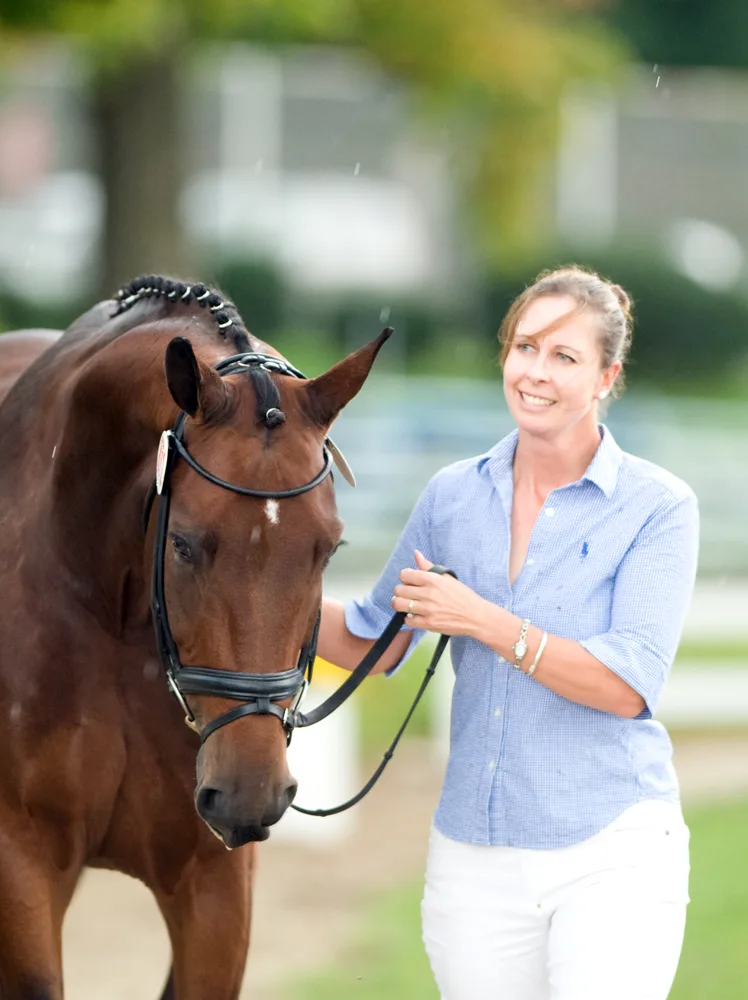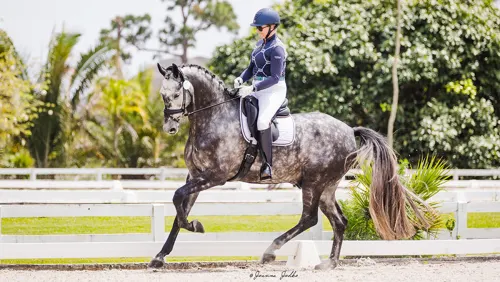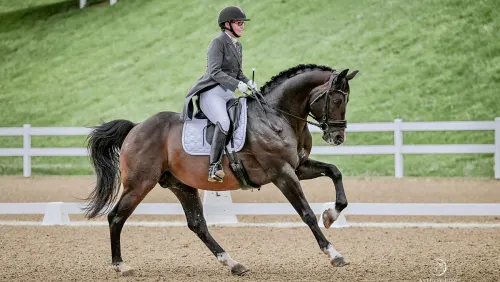One of the hardest things for young professionals in any discipline to master is the art of actually generating income. “It’s difficult when you first start out because you’re not sure what to charge [for training or lessons],” said up-and-coming dressage trainer J.J. Tate, 34. “You’re kind of amazed that someone’s going to pay you to do what you love, so you’re tempted to give half of it away, but you do need to make a living at it.”
Many young professionals with limited means do much of the barn work themselves. They simply can’t afford to hire help, so 16-hour days spent feeding, mucking, riding and teaching become the norm. “You end up doing everything to save money, but then you exhaust yourself,” Tate said. At a certain point, the scales tip and it should become more lucrative to hire other people to help with barn tasks and focus on riding and teaching.
“When I first moved my business to the Hassler’s four summers ago, it was me and my head groom with nine horses. I was cleaning stalls and feeding and I loved it. But now I have 20-plus horses in training, and I can’t spend that time doing barnwork,” Tate said. “It got to the point where I found myself cleaning a stall and thinking, ‘This is not me spending my time well. What am I best at? I’m best at riding and teaching.’
“It became worth it to me to pay someone to clean the stalls so that I could, 1. focus more on my riding, and 2., bring in more income. I needed to pay someone else to do some things, but then I needed to teach this many other lessons or clinics to pay for that.
“It’s important to learn how to value your time. A lot of us who have to climb up through the ladder one rung at a time have trouble letting go of the everyday tasks and thinking that we’re actually good enough to just sit on horses or teach all day long,” Tate said. “But it’s all about valuing where you’re putting your energy and what your time is worth. You have to have a good feeling of how much time you need to put into riding and teaching in order to pay for help; it all has to balance.”
But it’s not just barnwork that can suck time for a young trainer. Paperwork such as billing and bookkeeping is another essential part of the business that can challenge an up-and-coming professional. Outsourcing those tasks can alleviate a lot of stress and effort. Tate has a student who helps her with the books. “She can’t afford to sponsor me with a horse, but she supports me by helping to get my bills out on time and doing all my invoices. That’s super helpful, because by the time you get home at night, you’re so exhausted that you don’t want to sit at the computer for four hours and do billing,” Tate said.
Building a strong support network is key for a young professional, and it’s valuable to seek out reliable and trustworthy help. If they’re students who can trade bookkeeping for lessons, all the better. “I think it’s important to find those other people who can help take some of the burden off in the other categories, so you’re not totally split in seven different directions and are able to focus on riding and teaching,” Tate said.
ADVERTISEMENT
For Tate, being her own boss is both a challenge and an intense reward. “I’m lucky enough to have my own business, so it’s easy to put 18 hours a day into it and take only one day off a month, because I’m not working for somebody. It’s not a paycheck that somebody is giving me. It’s my career and my business,” Tate said. “The harder I work, and the more time I put into it, the more I get rewarded. Your team of horses and students just starts to build. Then all of a sudden, you stop and look back and you’re like wow, when did this happen?”
One major threat to a young professional’s success is burn-out. A career with horses is guaranteed to involve long, hard days and frustrating setbacks. Tate is firmly of the belief that each professional needs to do some self-examination to figure out how to mentally refresh themselves.
“You really have to analyze where you put your energy and what tires you out, and what builds you up. Anything can help recharge you,” she said. “Some people have to get away from the barn. For me, it’s staying late at the barn, when I’m there alone, grooming my horse and just being with my horses quietly, that I find really meditative and rebooting. What I do it for is that i love the horses and I love riding. So, that’s very rebuilding for me.”
Tate’s husband, Richard Malmgren, also urges her to spend a day or two here and there away from the horses, which she finds refreshing as well. But traveling to teach is her favorite alternative to her normal day.
“You just have to know yourself and know where you find inspiration. For me, I love to teach clinics. I love to give people homework and see in two days a big change in the horses and riders,” Tate said. “When I go away to a clinic it’s usually an easier day than my normal day, and I typically get more sleep than my normal day. I know that where I gain my inspiration is inspiring other people to ride their horses better. Something that could be thought of as work is actually something that re-inspires and me and reminds me why I do all of it.”
This article is further discussion about the sbuject of the article “Working Your Way To The Top Isn’t Just For Fairytales,” which ran in the April 30, 2012 issue of the Chronicle, the Dressage Issue. If you enjoyed this article and would like to read more like it, consider subscribing. Check out the table of contents to see what great stories are in the magazine this week.















